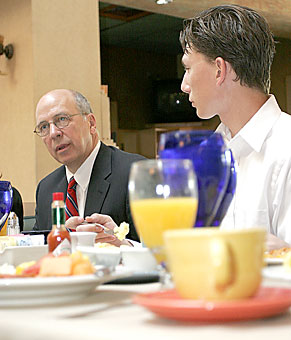 |
|
PHOTOS BY JAKE LACEY/Arizona Daily Wildcat
|
ASUA Senator-elect Matthew Boepple and other students share breakfast with Provost George Davis in an informal question-and-answer session yesterday morning at the Marriott Hotel.
|
|
|
By Natasha Bhuyan
Arizona Daily Wildcat
Friday, April 15, 2005
Print this
Undecided Davis talks issues over breakfast
Administrators are not voicing their support for a mandatory meal plan until more discussions take place, Provost George Davis said yesterday during a breakfast with 10 students.
Davis said most administrators are not taking a stance on the issue because they have only received one presentation on the possibility of a meal plan.
While administrators understand the Student Union Memorial Center's financial situation, Davis said they are also interested in what the students have to say.
"I respect Dan Adams a lot. ... I don't think he's just out there trying to make a buck," Davis said. "But I don't think (the meal plan) should be rushed."
Earlier this month, President Peter Likins also said he will not send "just anything that comes to my desk" to the Arizona Board of Regents for approval unless it has been thoroughly dissected among students and student union administrators.
Both Arizona State University and Northern Arizona University passed mandatory meals plans earlier this year. Davis said ASU administrators defended their meal plan by saying it would increase retention.
Davis said although a meal plan at the UA could affect retention by creating a sense of community, the dialogue has not occurred yet.
Matt Loehman, Associated Students of the University of Arizona senator-elect who plans to work on the meal plan issue, said he was glad to hear Davis' perspective because mostly Residence Hall Association and ASUA have weighed in on the matter.
During the hourlong breakfast, organized by ASUA, Davis fielded other questions from students ranging from budget cuts to program fees to playing his harmonica.
Davis reaffirmed the UA's goal to become a Hispanic serving institution in 10 years while also tightening admissions standards.
Although the two goals may seem paradoxical, Davis said the Hispanic population is already growing at a rate that will result in a higher attendance; the UA is simply trying to advance that curve.
At the same time, administrators will not use quotas to achieve diversity because such a move would set the university back, Davis said.
When asked about UA lobbying efforts, Davis said the UA is continuing to lobby the Legislature, asking for $7 million for the expansion of the College of Medicine to Phoenix on top of other decision packages.
However, with shrinking state appropriations, Davis pointed out administrators have accepted the fact that they cannot rely solely on state funding, hence the recent budget cuts in an attempt to reallocate money at the UA.
"The state of Arizona is satisfied with good universities," Davis said. "We want beyond good."
Davis also touched on the contentious topic of the value of researched-based subjects versus areas like history and psychology.
Because research fields have the potential for outside funding, administrators have hinted at the possibility of reallocating central funds to support "social and behavioral" subjects, which are facing dwindling operating budgets.
Cade Bernsen, student body president-elect, said he was impressed with Davis' candidness and has been pleasantly surprised in meeting with UA administrators and appreciates their hospitality and access.
"We are fortunate to have a provost who will take the time out of his busy schedule to come have breakfast with students and answer questions so openly," Bernsen said.
Davis was so talkative he hardly touched his bacon and eggs.
